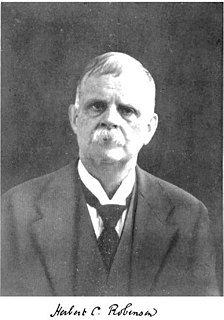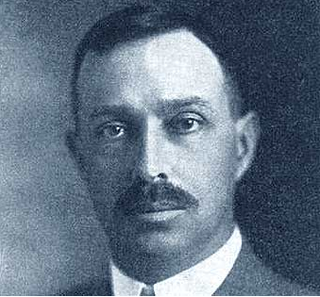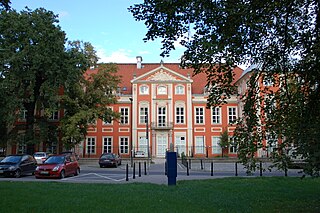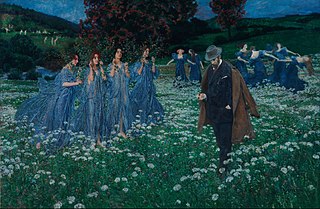Publications
| | This section is empty. You can help by adding to it. (July 2010) |
Timeline of anthropology, 1900–1909
1902
1906
| | This section is empty. You can help by adding to it. (July 2010) |
1902
1903
1905
1902
1905
1906

Andrew Lang was a Scottish poet, novelist, literary critic, and contributor to the field of anthropology. He is best known as a collector of folk and fairy tales. The Andrew Lang lectures at the University of St Andrews are named after him.
The Combat Organization was the terrorist branch within the Social Revolutionary Party of Russia. It was a terror sub-group that was given autonomy under that Party. In his memoirs, group member Boris Savinkov called the group the "Terrorist Brigade."

A Burschenschaft is one of the traditional Studentenverbindungen of Germany, Austria, and Chile . Burschenschaften were founded in the 19th century as associations of university students inspired by liberal and nationalistic ideas. They were significantly involved in the March Revolution and the unification of Germany. After the formation of the German Empire in 1871, they faced a crisis, as their main political objective had been realized. So-called Reformburschenschaften were established, but these were dissolved by the National Socialist regime in 1935/6. In West Germany, the Burschenschaften were re-established in the 1950s, but they faced a renewed crisis in the 1960s and 1970s, as the mainstream political outlook of the German student movement of that period swerved to the radical left. Roughly 160 Burschenschaften exist today in Germany, Austria and Chile.

The Order of the Black Eagle was the highest order of chivalry in the Kingdom of Prussia. The order was founded on 17 January 1701 by Elector Friedrich III of Brandenburg. In his Dutch exile after World War I, deposed Emperor Wilhelm II continued to award the order to his family. He made his second wife, Princess Hermine Reuss of Greiz, a Lady in the Order of the Black Eagle.
The Düsseldorf school of painting is a term referring to a group of painters who taught or studied at the Düsseldorf Academy during the 1830s and 1840s, when the Academy was directed by the painter Wilhelm von Schadow.
The Free-minded National Association was a political party in Sweden. The party was in government from 1905 to 1906 and from 1911 to 1914 under the leadership of Karl Staaff, from 1917 to 1920 under the leadership of Nils Edén, from 1926 to 1928 and from 1930 to 1932 under the leadership of Carl Gustaf Ekman and briefly from August to September 1932 under the leadership of Felix Hamrin.

Moriz Winternitz was a scholar from Austria who began his Indology contributions working with Max Müller at the Oxford University. An eminent Sanskrit scholar, he worked as a professor in Prague in the German part of Karl-Ferdinands-Universität after 1902, for nearly thirty years. His Geschichte der indischen Literatur over 1908-1922 period was a major and comprehensive literary history of Sanskrit texts. The contributions on a wide range of Sanskrit texts by Winternitz have been an influential resource for modern era studies on Hinduism, Buddhism and Jainism.

Herbert Christopher Robinson was a British zoologist and ornithologist. He is principally known for conceiving and initiating the major ornithological reference The Birds of the Malay Peninsula.

Alfred Cort Haddon, Sc.D., FRS, FRGS FRAI was an influential British anthropologist and ethnologist. Initially a biologist, who achieved his most notable fieldwork, with W.H.R. Rivers, C.G. Seligman and Sidney Ray on the Torres Strait Islands. He returned to Christ's College, Cambridge, where he had been an undergraduate, and effectively founded the School of Anthropology. Haddon was a major influence on the work of the American ethnologist Caroline Furness Jayne.

Walter Edmund Roth was a British colonial administrator, anthropologist and medical practitioner, who worked in Queensland, Australia and British Guiana between 1898 and 1928.

Roland Burrage Dixon was an American anthropologist.
The Stern Conservatory was a private music school in Berlin with many distinguishded tutors and alumni. The school is now part of Berlin University of the Arts.

The Minister for Education is the education minister of Sweden and the head of the Ministry of Education and Research.

Academy of Fine Arts in Warsaw is a public university of visual arts and applied arts located in the Polish capital. The Academy traces its history back to the Department of Arts founded at the Warsaw University in 1812. As a separate institution it was founded in 1844 during the Partitions of Lithuania-Poland. In an upgrade in 1904 it was named the Warsaw School of Fine Arts; and in 1932 it received recognition as an Academy. At first the institute did not have its own building and classes were held in several locations around the city. Following an architectural competition a design by Alfons Gravier was chosen and construction began in 1911. The building was completed by the outbreak of the First World War.
Alfred Ernest Crawley was an English schoolmaster, sexologist, anthropologist, sports journalist and exponent of ball games.
Ludwig Woltmann was a German anthropologist, zoologist and neo-Kantian.

Maximilian Lenz was an Austrian painter, graphic artist and sculptor. Lenz was a founding member of the Vienna Secession; during his career's most important period, he was a Symbolist, but later his work became increasingly naturalistic. He worked in a variety of media, including oils, watercolours, lithography and metal reliefs.
Yvonne de Pfeffel was a French tennis player in the first decade of the 20th century.